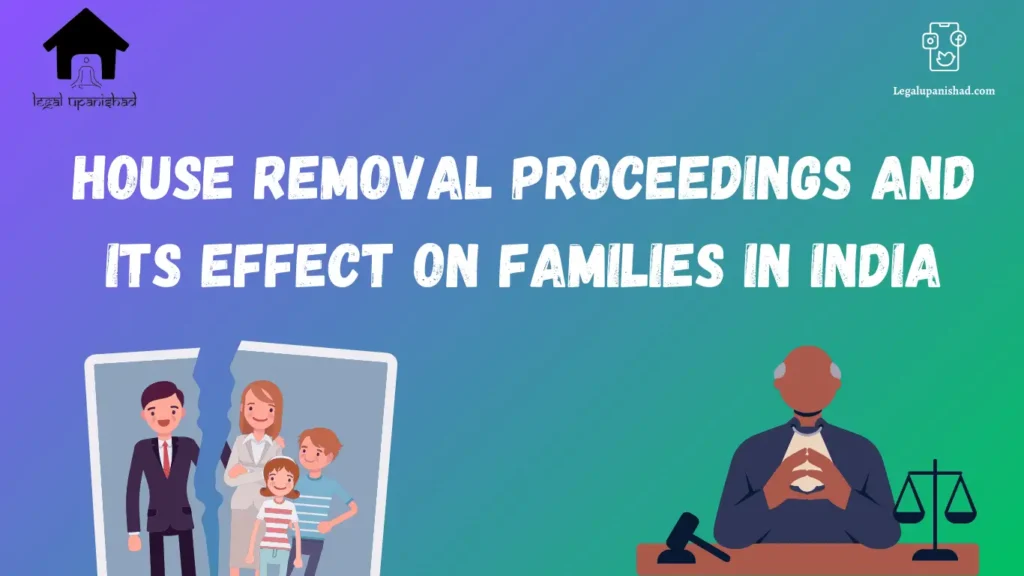This article on ‘House Removal Proceedings and its Effect on Families in India’ was written by an intern at Legal Upanishad.
INTRODUCTION
House removal proceedings are the proceedings in which the owner or co-owner of the house has the legal right to evict the person from the house which generally happens in matrimonial cases and has a bad impact on the family stability and security. It totally depends on the facts and circumstances of each case, who will be evicted from the house. The person can be a spouse, former spouse, child, parents, another person or an occupant.
The court only has the power to grant or deny the order of removal from the house of the person. However, before passing an order of removal of a person from the house, the court shall first consider the effects of such order on the person and family. In this article, we are going to learn about house removal proceedings in-depth and their impact with the help of decided cases.
WHAT IS HOUSE REMOVAL?
House removal proceedings are not defined specifically neither in any act nor in any statute. However, eviction is defined in the civil procedure code which states that the landlord has civil power to remove the tenant from the property in case of breach of tenancy agreement or on other terms which are permitted by law. But this term only considers tenant removal. But in this article, we are going to talk about the removal of persons not limited to tenants only.
In general, house removal means the removal of a person from a house who can be any person such as a co-owner, spouse, children, or parents, who shares joint or shared property. House removal proceedings are governed under different statutes and acts such as Hindu law, Criminal procedure code, Specific Relief act, Domestic Violence Act etc.


INDIAN LEGAL FRAMEWORK
Proceedings of House removal vary from statute to statute as well as based on facts and circumstances of each case with regard to party and property which are as follows: –
The Criminal Procedure Code,1973
This code provides proceedings for criminal cases. Under this section 125 provides a remedy that is speedier and more effective than that available in civil courts. This section is not limited to Hindus, under this section a person from any religion can seek remedy. This section empowers courts to pass an interim order for the maintenance of wives, children as well as parents against the person who can maintain. In Mohd. Ahmed Khan vs. Shah Bano Begum, 1985 SC states that divorced Muslim women’s claims can be determined for maintenance under section 125 of CRPC.
The Hindu Marriage Act,1955
This act governs only Hindus and Hindus under this section consisting of Jains, Christians, Sikhs and Buddhists. This Act provides remedies like the dissolution of marriage, maintenance, alimony and custody of the child. Sections 10 & 13 of this act provide remedies like judicial separation and dissolution of marriage respectively in which the court may pass an interim order for the removal of a person from the house which is dependent on the facts and circumstances of the case.
The Specific Relief Act,1963
In this act, any party who is the party in a suit can ask for specific relief. This act provides a remedy to protect individual civil rights and not for the enforcing of penal laws. Under this act, a person can ask for remedies such as specific performance of contract, injunction, claim for damages etc. On the breach of contract and violation of legal rights of person. Under this act the party can file the suit for ejectment i.e., to remove the person from the property who has no legal right in the property (section 5).
In Ismail Arif vs. Mohammed Ghouse Cal 834, The privy council held that the title of possession of property was sufficient evidence against the defendant as the title of owner.
This act empowers the court to grant an injunction under sections 36 to 42 of SRA against the person to prevent him from interfering in any property of another person without any right. There are different kinds of injunction under this act which are as follows: –
- Temporary Injunction: A temporary injunction is an injunction that is granted by the court for a specific period of time and until further order of the court. This injunction can be provided by the court at any stage of the proceedings of suit.
- Perpetual Injunction: Perpetual injunction is an injunction that is granted by the court to the plaintiff against the defendant to prevent the defendant from doing an act that is contrary to the rights of the plaintiff. This injunction can only be granted by the decree at the time of hearing.
- Prohibitory Injunction: Prohibitory injunction is an injunction that is granted by the court against the defendant to prevent him from doing or continuance of a wrongful act that affects the rights of the plaintiff. The purpose of this injunction is to restrain the person from repetition, continuance, or commission of some wrongful act. This injunction is also known as preventive relief.
- Mandatory Injunction: Mandatory injunction is an injunction that is granted by the court to restrain the defendant from continuing to do some wrongful act by ordering the defendant to undo the things that have been done or to restore the things to their former conditions.
The Civil Procedure Code,1908
This code provides civil remedies such as injunction, ejectment, partition etc to the parties. In case of eviction i.e., to remove the tenant from rental property, the suit before the rental controller is governed by the procedure of the civil procedure code and this act also provides remedy of a temporary injunction under order 39. to the plaintiff against the defendant.
The Domestic Violence Act,2005
This act provides several reliefs to the women who are victims of domestic violence including the right to reside. This act empowers the court to pass an order against the respondent to restrain him from dispossessing or disturbing the possession of women in a shared house. In this act, the court has the power to pass an order in favour of a woman to let her reside in a shared house with his husband.
FACTORS THAT NEED TO BE CONSIDERED DURING HOUSE REMOVAL PROCEEDINGS
The court has the power to grant an order for house removal. However, before granting the order the court shall consider the facts and circumstances of each case because the facts and circumstances of each case are varied. There are some factors that need to be considered as follows: –
- The financial status and requirements of the party.
- The welfare and stability of children, if any are involved.
- The capability of a person such as he or she is of sound mind, able to earn, majority status etc.
- The person has any alternative option of accommodation or not.
- The relationship between the parties.
- The nature and action of parties towards one another.
- The nature of the ownership and the interest of parties in property.
CONSEQUENCES AND IMPACT OF HOUSE REMOVAL
House removal proceedings have a great bad impact on the factors of a person such as health, finance, mental, social etc. A few factors are discussed below-
- Psychological Impact: A person feels a lot of anxiety, stress, depression and instability about their future and living conditions. The person loses a familiar and comfortable environment which leads to sadness and grief. Children are vulnerable by nature and house removal leads them to the situation of confusion and fear.
- Financial impact: House removal proceedings cause a lot of disruption and disturbance in the life of the person including new accommodation, deposit, rent, cost of moving, unexplained expenses etc. which leads to financial strain. Sometimes financial strain also causes depression and insomnia.
- Education Disruption: House removal proceedings also cause disturbance in the education of children, as they may need to change schools in mid-term, and face new challenges such as making new friends, and adapting to a new environment with new teachers and students which leads the children towards the feeling of fear and stress.
- Social Disconnection: A person often has strong connections in their surroundings and neighbourhood and house removal can break these ties and force the person to live in isolation. The forced removal has an impact on all beings which causes stress, depression and anxiety in person.
- Health Issue: Moving from one place to another place causes physical strain as well as mental strain on the person. Physical and mental strain, fatigue, stress, anxiety and depression. Poor mental health further compromises physical well-being.
SUGGESTIONS AND CONCLUSION
The proceedings of house removal are very complex and ambiguous. It is not clearly mentioned either in any statute or in any act. So, in my opinion, the procedure of house removal should be mentioned clearly which helps the person to prevent the complexity of the procedure.
House removal proceedings are the proceedings in which the court has wide discretion to grant or deny the order of removal and it has a direct impact on family law matters such as divorce, maintenance, custody, judicial separation and domestic violence. People are not well aware of the proceeding of house removal due to the complexity and ambiguity of this proceeding. So, further steps should be taken such as social programs related to law to inform people about our laws.
LIST OF REFERENCES
- The Code of Criminal Procedure,1973 (Act 01 of 1974)
- House Removal proceedings and its Impact on Family law in india, Abhishek Barowalia, available at: https://www.abhishekbarowalia.com/2023/07/house-removal-proceedings-and-its.html
- Renu Pavi, House Removal Proceedings And Its Impact On Family Life, Lawyers Club India, 29 August 2023, available at: https://www.lawyersclubindia.com/articles/house-removal-proceedings-and-its-impact-on-family-life-16118.asp

